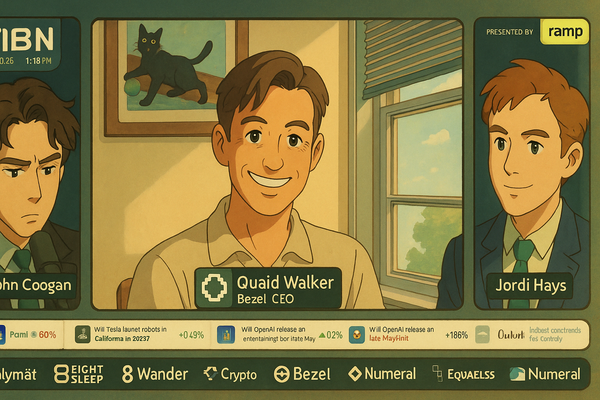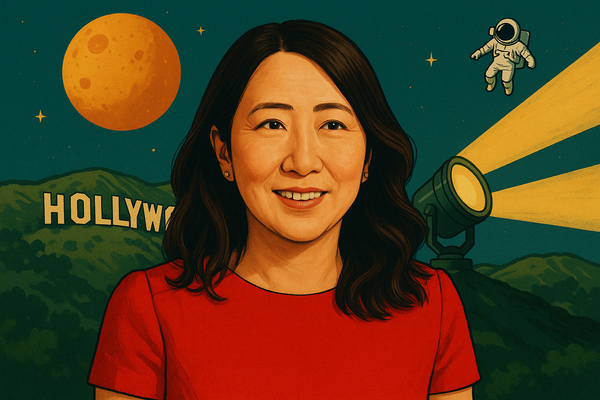AI wars
Plus: a conversation with Dotdash Meredith CEO Neil Vogel and Axios senior media reporter Sara Fischer

Greetings from Belgrade, the final leg of my European trip. Europe is overrun with Americans. You don’t hear as much about how Americans don’t have passports. The expressed dissatisfaction with the US economy doesn’t match the revealed ability for many to furiously shop in the Marais. Also, the US needs a Fete de la Musique. I don’t see AI or VR disrupting that.
Couple quick things:
- The Rebooting and WordPress VIP are collaborating on an event on July 11 in New York that will bring together product leaders at publishers to discuss what publishers should build in this time of disruption when predicting the landscape even three years into the future is difficult. The Media Product Forum will run from 4:30-6:30 and participants include product leaders from Hearst, Forbes, Dotdash Meredith, Gannett and more. We are limiting this event to 50 participants. To claim one of the final spots, send me an email at bmorrissey@therebooting.com.
- Alongside the event, we are conducting a research report on the state of product at publishers. Please complete this short survey to provide your perspective.
Below: AI wars kick off, and a conversation with Dotdash Meredith CEO Neil Vogel and Sara Fischer. First up, a message from Wordpress VIP.

Defining PMC’s content production playbook across brands
Discover how Penske Media Corporation unified their digital publishing operations, driving growth and efficiency across 22 flagship brands like Variety and Rolling Stone, with WordPress VIP’s scalable platform. Read the case study.
AI wars
AI’s collision with publishing promises pour fuel on factional disputes that have festered for some time.
Boss class vs workers. There’s a widening divide between leadership and workers. Executives tend to see AI changing the already strained economics of their businesses, and they are scrambling to get ahead. It also serves as a handy excuse to make needed organizational changes to thin the workforce in the name of efficiency. One publishing CEO groused to me that they believed the company could cut half the people and “nothing much would change.” I increasingly hear frustration expressed by the heads of news publishers that workers “don’t get it” with the challenges faced by these businesses.
The deals cut with publishers have led to several objections by journalists at The Atlantic, Business Insider, Vox Media and more. The management-unions clashes will accelerate, with the deployment of AI tools a particular flashpoint. A lot of this stems from a loss of trust because newsrooms feel they usually bear the brunt of poor decisions made by management, such as a certain pivot. With AI, one person’s efficiency is another’s layoff. One publishing executive marveled at the idea of The Washington Post’s newsroom investigating its CEO and undermining its incoming editor. Expect more fireworks on this front.
Publishers vs Google. In all my years tracking the uneasy relationship between publishers and Google, I’ve never heard more frustration from publishers. Mostly this stems from Google’s pivot to unreliability. The clumsy rollout of AI Overviews is a case in point. The algorithm updates have rankled many publishers to the point of exasperation. These frustrations have simmered below the surface for some time as Google has kept more traffic within its walled garden. That breaks the understood dea that’s underpinned the open web.
“They’ve changed the bargain,” said Neil Vogel, CEO of Dotdash Meredith. “Now, they’ve taken our content to compete with us.”
Publishers vs Perplexity. Perplexity CEO Aravind Srinivas is an unlikely villain. But Perplexity is set to occupy that role, as it is fighting an uphill battle to carve a future as an AI-powered “answer engine.” Let’s just say battling Google has not been for the faint of heart. Perplexity is understandably going to be aggressive, such as creating a product that repurposes paywalled content while promising revenue sharing at some point, and ignoring the Robots.txt standard that’s become synonymous with the unwritten bargain of internet search. Publishers could opt out of crawling if they wanted. True to form, Perplexity is leaning on plausible deniability by assigning an unnamed third-party crawler as the one taking liberties. Some things don’t change. I trust that Perplexity’s reported new $250 million round includes a healthy amount for lawyers.
“They’re not going to stop what they’re doing because they got a [legal threat] from a publisher,” Sara noted.

Discover Onyx
To truly harness the open internet's potential, brands need predictive technology that can identify the moments of high attention and elevate consumer engagement for meaningful outcomes. Enter Onyx by Outbrain, the solution that empowers your brand to make an impact where it counts. Discover Onyx.
The math is mathing

Neil Vogel wants to make a few things clear:
- The news industry is not the publishing industry
- Bad businesses are bad businesses, with or without AI
- Doing nothing is a choice and nearly always the wrong one
- If you don’t like adapting to change, publishing is the wrong industry
As Cannes wound down last Thursday, I was joined at the Dotdash Meredith villa by Neil and Sara Fischer, senior media reporter for Axios, in a live, poolside recording of The Rebooting Show. Some key points:
The AI deals are a smart hedge. Sara made the point that the option for publishers is sue, do a deal or do nothing. And option 3 isn’t palatable when competitors are striking deals – remember the few weeks of talk of publishers banding together? – the choice for many publishers will be to strike deals that make sense now and retain options for the future. Dotdash Meredith struck a deal with OpenAI and is working on others. “We want a very favorable economic solution with people who have already taken and are using our content,” he said. “If we can get to an economic solution, great. We got to an economic solution with OpenAI. We're talking to a few other people. If we cannot get to an economic solution with you, then we have to weigh all of our options.” It’s early, but Neil said he was “super happy” with the deal so far.
Publishing isn’t going extinct. Sara made the point that a lot of the ZIRP craziness is leaving the industry. It’s a painful correction but hardly unexpected. “Some publishers were ill-equipped to ride some of these changes,” she said, “but they would have gone out of business anyway.” Neil added math: “We are double-digit revenue growers the last two quarters,” he said. “Everyone is confusing challenged businesses and challenged business models with something wrong with the industry. There is nothing wrong with the industry.”
Adapt to change. There can be an understandable tendency in publishing to focus on external challenges – and to pine for the past. Instead, this is an industry that challenges businesses’ ability to adapt. “It's no ‘pivot to events’ to nonsense,” Neil said. “Get very high-quality scale, under high-quality brands, [then] deliver real value to advertisers and consumers. These have been the rules of media for a hundred years.”
The math is mathing. From the start of algorithmic distribution, publishers have dealt with shifts. The current state is more of the same, if perhaps accelerated. That means any change will yield winners and losers, although sending less traffic out to publishers is a net loss overall for the open web. “We've talked about this for going on a decade now: If you're a publisher and you blame algorithms for your problems, you're a very bad publisher,” Neil said.
Thanks for reading. Send me a note with feedback by hitting reply.




